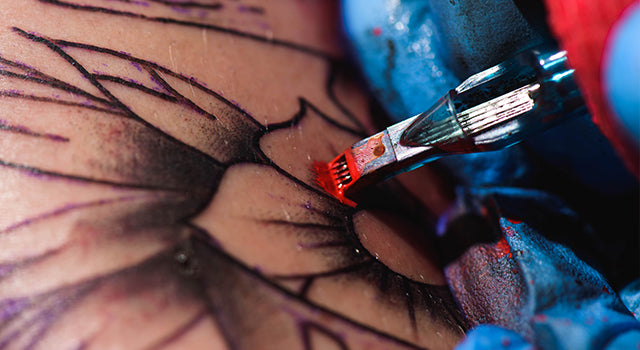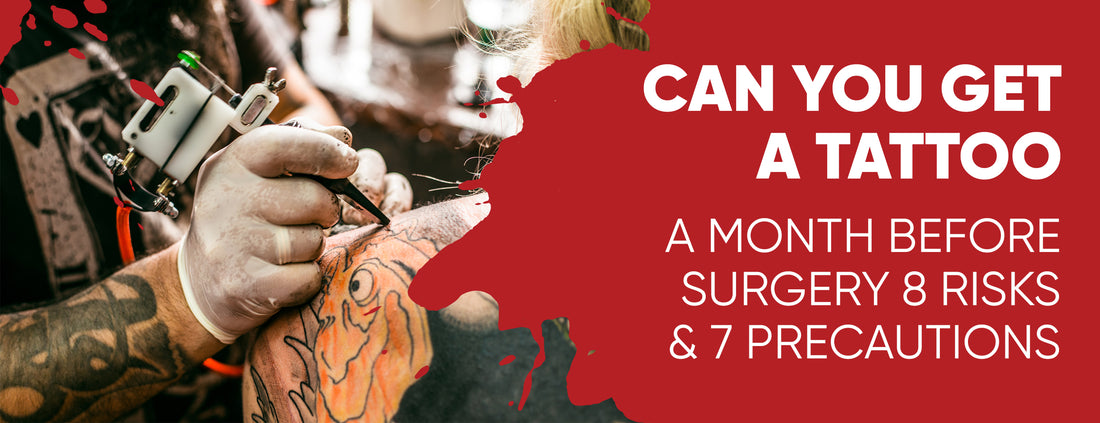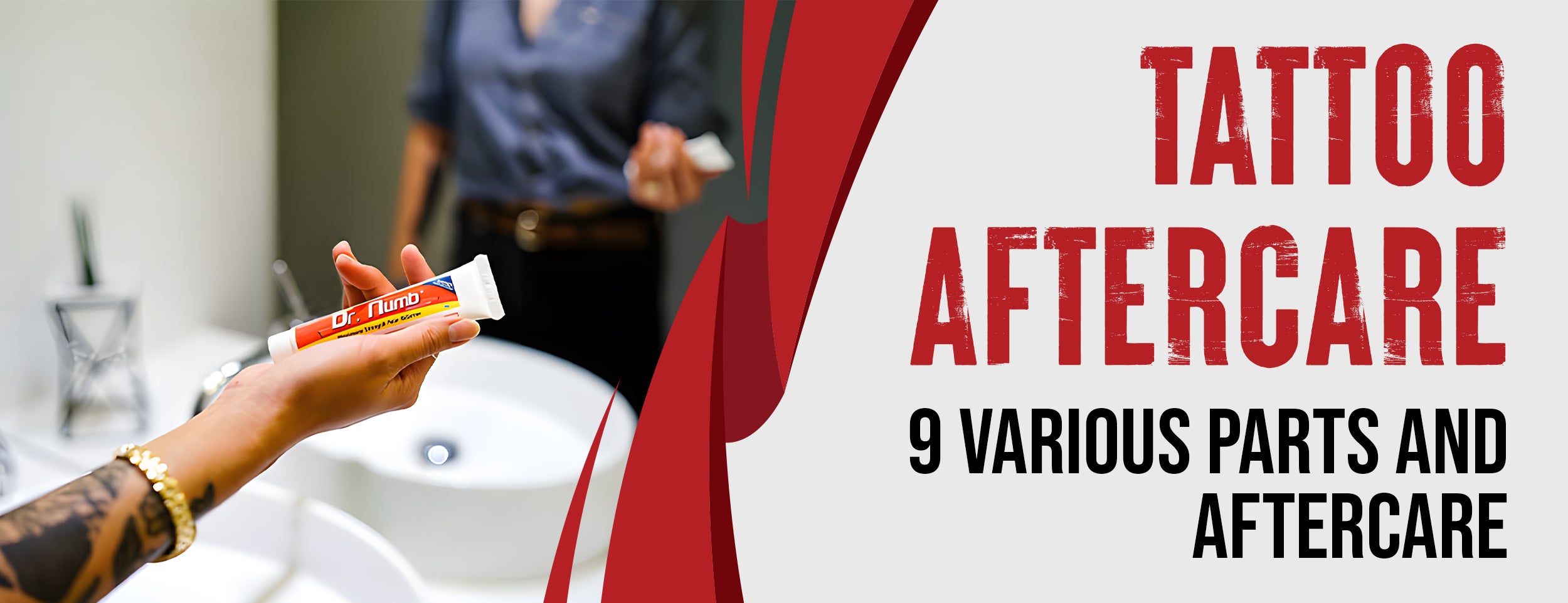A tattoo before surgery can raise concerns and confusion. Healing may be delayed if done a month before surgery, increasing the risk of infection. Tattoos near the surgical site can affect the accuracy of the procedure, especially with breast surgeries and cancer detection. Careful consideration is essential before getting inked before surgery.
To reduce the risk of preoperative infection, you should avoid getting tattoos (including eyebrow microblading) within two weeks of the surgery.
To help minimize the pain during the tattoo process, apply Dr. Numb® numbing cream. Additionally, follow your tattoo artist’s aftercare instructions carefully to ensure proper healing and reduce the risk of complications before your surgery.
In this blog post, we will discuss the possibility of tattoos before surgery, the potential risks of getting a tattoo before surgery, the advantages to get a tattoo before surgery, and the precautions to take before.
Can You Get a Tattoo a Month Before Surgery: 8 Risks

It is essential to minimize potential risks to your health. If you are considering getting a tattoo before your surgery, it is necessary to understand the risks involved and how they might affect your upcoming medical procedure. Here are some dangers associated with tattoos before surgery:
- Increased Risk of Infection: Getting a tattoo involves puncturing the skin, which can introduce bacteria and other harmful pathogens into the body. After getting a tattoo, there is always a risk of infection, which can cause serious problems during and after surgery.
- Adverse Reactions to Tattoo Ink: Some people may experience an allergic reaction to tattoo ink, leading to itching, swelling, and redness. Medical attention may be required in rare cases of severe reactions.
- Interference with Medical Equipment: During surgery, medical equipment monitors vital signs and ensures that everything works properly. If a tattoo is in an area being monitored, it could interfere with the accuracy of these devices and potentially cause complications during the procedure.
- Delayed Healing: After getting a tattoo, the skin takes a few weeks to heal fully. Sometimes, the tattoo may become infected or take longer to heal than expected, which could delay your surgery.
- Surgical Site Infections: Tattoos can introduce bacteria into the body that can lead to surgical site infections. This can cause a more extended hospital stay or even a higher risk of readmission.
- Difficulty in Imaging: After getting a tattoo, it can make it more challenging for doctors to perform diagnostic tests like X-rays, CT scans, MRIs, and some medical tests. This is because tattoos can obscure these images and make it harder for doctors to see what's going on inside your body.
- Possible Bleeding: Getting a tattoo involves a lot of bleeding, which can cause issues during surgery. Increased bleeding complicates the ability of surgeons to see and manage blood vessels, increasing the risk of complications.
- Interference With Anesthesia: Certain types of tattoo ink can interfere with anesthesia, making it more difficult for the surgeon to control your pain levels during surgery. While this is uncommon, patients need to be aware of the risk.
Tattoos Before Surgery: 6 Benefits

Many people opt for tattoos before surgery for various reasons. While most people may not think of tattoos as beneficial before surgery, there are several benefits of getting a new tattoo. Here are some advantages to getting a tattoo before undergoing surgery:
Reduces Stress and Anxiety
Surgery can be stressful and overwhelming for many people. Getting a new tattoo can help reduce stress and anxiety levels before surgery. Getting a tattoo releases endorphins, which lower stress levels and promote relaxation. By getting a new tattoo, patients can feel more relaxed before surgery.
Aids in Pain Management
Tattooing involves using needles to penetrate the skin, which can be painful. However, the pain caused by getting a tattoo can also help patients prepare for post-surgery pain. Researchers have found that people who get tattoos have a higher pain tolerance and are better able to cope with pain than those who don't. By inking a new tattoo before surgery, patients can better train their minds to handle pain and discomfort during recovery.
Boosts Self-Confidence
Going through surgery can leave patients feeling vulnerable and uncertain about their appearance. A new tattoo before surgery can help boost self-confidence and self-esteem. It can help patients feel more in control of their bodies and provide a sense of empowerment during a difficult time.
Provides a Distraction
Getting a new tattoo can also distract from the upcoming surgery. It can be a fun and exciting experience for the patient to focus on instead of worrying about the surgery. The process of getting a tattoo and the results can provide a positive distraction that takes the patient's mind off the surgery.
Fosters Positive Body Image
People who get tattoos often report increased confidence and a better sense of self. This confidence-boosting effect can carry over into the surgical setting, where having a positive body image can be essential. While being prepared for surgery, feeling good about oneself can help reduce the fear and anxiety associated with it, making the total experience more manageable.

Engenders Conversation
Getting a tattoo can be a conversation starter. It can be something to discuss with surgical staff before the procedure, which can help ease any tension and build rapport with the medical team. It can also make a person feel more comfortable during the surgery, knowing that the medical staff is more than strangers in scrubs.
7 Precautions for Tattooing a Month Before Surgery
Statutory laws across all 50 states require people to be at least 18 to receive a tattoo. You should take precautions if you have surgery scheduled soon. A month before surgery, keep these tips in mind:
-
Consult with Your Doctor: Discuss potential risks with your surgeon before getting a tattoo. People with diabetes are often cautioned to avoid tattoos because of infection risks and potential healing disruption.
However, it shouldn't deter you from getting inked or pierced. It's advisable to wait at least six weeks post-surgery before considering piercings and laparoscopic surgery. - Choose a Reputable Tattoo Artist: Do your research before choosing one. Look for someone licensed, experienced, and practicing safe tattooing procedures. Infection risks and potential complications can be reduced. A skilled tattoo artist can create a temporary tattoo known as "Real Tattoos," designed to fade within 3 years naturally.
- Practice Good Hygiene: Ensure good hygiene before and after getting a tattoo. This includes washing your hands before and after touching your tattoo, keeping the area clean, and avoiding swimming or submerging the tattoo in water for at least two weeks.
- Avoid Certain Medications and Substances: Certain antibiotics can cause complications and harm healing. Before getting a tattoo, consult your doctor regarding any medications or supplements you currently use. They provide numbing before the tattooing process. Refrain from drinking alcohol and taking blood thinners for a minimum of 24 hours post-tattooing.
- Do not Get a Large Tattoo: If you plan to get inked, avoid getting a large tattoo a month before surgery. Large tattoos can cause inflammation, increasing the risk of complications during surgery. A small and simple tattoo with minimal complications is better.
- Avoid Certain Areas of the Body: Getting a tattoo in some regions of your body increases the risk of infection and allergic reactions. Avoid tattoos on areas of your body where surgical incisions may be made, such as the abdomen, back, or chest.
- Follow Proper Aftercare Instructions: Following aftercare instructions after getting a tattoo will prevent infections. After getting a permanent tattoo, keep it clean, avoid direct sunlight, and avoid swimming and soaking it for at least two weeks. Remember, if you received a tattoo in the last three months from a state-regulated facility with sterile needles and fresh ink and meet blood donor eligibility requirements, you can donate blood!
Conclusion
If you're scheduled for surgery in a month and are considering tattoos, it's essential to weigh the factors we've discussed in this post. It's best to err on caution and avoid getting inked until after the surgery. If you decide to go through with it, consult your doctor and take extra precautions to ensure proper hygiene and care. Remember, your health should always be a top priority.













![Antibiotics and Tattoos: 3 Risks and 3 Effects [with 4 Precautions]](http://drnumb.com/cdn/shop/articles/Can_You_Get_Tattooed_On_Antibiotics__3_Risks_and_3_Effects_4_Precautions.jpg?v=1714128292)

